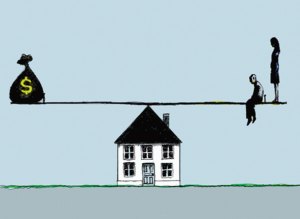 In my early thirties, I decided that I wanted to make a million dollars at some point. I was making about $35,000 a year total income, had a home that was heavily mortgaged and two kids, and my wife stayed home to raise the kids. A pretty traditional life since I fit in well with my peers. There was one difference, I wanted to have a million dollars in assets before I retired. At the time making my first million looked like a huge challenge. I was not sure how I was going to accomplish this seemingly unattainable feat, however looking back on it now, it was relatively easy although not without some risk.
In my early thirties, I decided that I wanted to make a million dollars at some point. I was making about $35,000 a year total income, had a home that was heavily mortgaged and two kids, and my wife stayed home to raise the kids. A pretty traditional life since I fit in well with my peers. There was one difference, I wanted to have a million dollars in assets before I retired. At the time making my first million looked like a huge challenge. I was not sure how I was going to accomplish this seemingly unattainable feat, however looking back on it now, it was relatively easy although not without some risk.
What Were My Strategies re Making My First Million
Making my first million was really a combination of strategies, listed below:
- Saving
- Investing
- Buying a home
- Starting a business
- Becoming a landlord
- Setting a budget
- Finding deals
- Doing it Yourself
Here is more detail about making my first million.
Saving – was definitely a factor in contributing to a million in assets. Like many consumers, I contributed to a retirement plan and the money grew from there. It was a factor that helped but certainly did not get me even close to the number I was looking for. Perhaps I did not save aggressively enough, however, my main objective was to reduce our mortgage which is another form of saving and reduces the overall interest that you pay.
Investing – in the right stocks, mutual funds, and bonds have also helped a great deal. Within my portfolio of investments which was my retirement plan, we made sure that we were invested in blue chip stocks that had a growth factor as well as a dividend paid every 3 months. Same with mutual funds. Bonds were something new to me and were part of my diversification strategy. When I invested in bonds I was able to buy bonds from good companies that paid in the 6% range which is very good by today’s standards.
Buying a home – was another huge advantage in terms of asset growth. Over the last 25 years, my home has doubled in value. Location and quality mean a great deal. We have been offered some really great deals for our home, however, we are not ready to sell just yet. Buying a home is so much better than renting in terms of asset growth.
Starting a business – we also started a small business which provided us with added income and tax deductions. It has not made a huge contribution to achieving the goal of a million dollars, however, it has helped.
Becoming a landlord – by buying several apartments and townhomes to rent out has definitely made a big contribution. We got the same asset growth that we did for our home and someone else paid for it i.e. our renters!
Setting a budget
Living within our means. We did not go into a lot of debt and have all of the toys that some people seem to have. We did go on a trip each year for two or three weeks and lately, we have been going away for several months in the winter. But the bottom line is that we lived within our budget and avoided racking up credit card bills which would have triggered high-interest charges.
Finding deals – and always s negotiating has saved us thousands. Our motto is “we always ask for a discount, the worst that will happen is that they say no” and they almost never say no. from 10% to as much as 50% savings have been obtained in this manner. When you apply this approach to everything you buy over 35 years, you can save thousands of dollars.
Doing it Yourself – is another way to save money and contribute a million dollars. When you consider that every $100 you pay someone to do some work for you means that you must earn from $150 to $200 in before-tax dollars, doing it yourself makes a lot of sense.
By applying all of these strategies we have easily attained our million-dollar objective and now I am wondering how I should go about getting to two million while continuing to enjoy life and of course my retirement. Any ideas? Comments welcome.
 Should you rent your home to retire early? This is the question many people ask themselves at various stages in life. Retired baby boomers traditionally have a home they have owned for many years. It is paid off and worth a small fortune. Should they unlock this value by remortgaging, selling and renting or take a reverse mortgage? What about millennials just starting out. Should they buy a home now and incur all of the maintenance expenses, taxes etc along with interest payments on the mortgage? Or should they rent an apartment and set aside the savings for investment?
Should you rent your home to retire early? This is the question many people ask themselves at various stages in life. Retired baby boomers traditionally have a home they have owned for many years. It is paid off and worth a small fortune. Should they unlock this value by remortgaging, selling and renting or take a reverse mortgage? What about millennials just starting out. Should they buy a home now and incur all of the maintenance expenses, taxes etc along with interest payments on the mortgage? Or should they rent an apartment and set aside the savings for investment?




